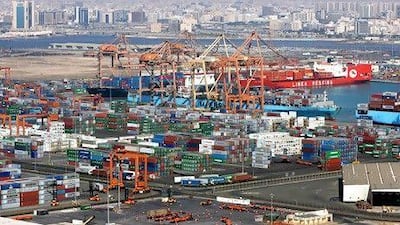Hundreds of tariffs imposed by Saudi Arabia on imports risk holding back the full operation of the GCC customs union in 2015, say UAE officials.
Saudi Arabia imposes customs duties of up to 20 per cent on selected imported commodities, such as matches and plastic bags, in an effort to protect fledgling national industries.
But the tariffs are higher than those charged by the UAE and most other GCC states.
"Saudi Arabia have customs duties to protect emerging industries," said Khalid Al Bustani, the assistant undersecretary for international financial relations at the Ministry of Finance. "This is a decision when you enter the customs union you have to remove tariffs. This is something that needs to be resolved."
The GCC customs union was set up in 2003 with a view to moving towards closer integration and bolstering stagnant levels of trade. It has had some success in raising trade, which more than trebled to US$90 billion (Dh330.57bn) in the seven years to 2010.
But obstacles have beset the running of key parts of the scheme ahead of the targeted date of 2015 for full operation of the union.
Saudi Arabia's "protection policy" was one of three issues still to be finalised, said Younis Al Khouri, the director general of the Ministry of Finance.
"Hopefully, by 2015 everybody will be ready, at least the outstanding issues can be resolved," he said.
"One is how the movement of goods between Bahrain and Oman, which have signed a free-trade agreement with the US, will work between the other four countries.
"One of the countries has a protection policy on 570 goods, also the relationship between the agencies and agents within the GCC - these three are the main items."
Officials are still trying to find a formula for how customs revenue will be distributed between states.
At the moment, country representatives meet every three months to settle outstanding invoices.
Officials want to set up a common fund into which all revenues are pooled then redistributed to members based on their share of trade.
But it is Saudi Arabia's high duties that are considered one of the biggest sticking points.
A technical team has been set up to help accelerate the rolling back of the kingdom's customs duties.
Saudi Arabia applies the common GCC tariff of 5 per cent for many goods. But other imports, such as plastic bags and matches, are still slapped with a 20 per cent duty. Tents, aluminium bars and rods, and furniture are subject to a 15 per cent tariff, with a 12 per cent tariff on 294 further items including some textiles. In contrast, most tariffs on imports by the UAE are set at 5 per cent.
A customs union, a form of trade bloc, involves countries agreeing on common external trade policy.

